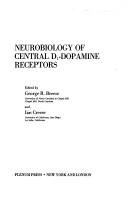
Neurobiology of Central D1-Dopamine Receptors
By George Breese
Subjects: Dopamine, Dopamine Receptors, Neurobiology, Receptors, Dopamine, receptors, Drug effects, Physiology
Description: Our understanding of the functional mechanisms relating dopamine activity to normal and abnormal has been turned "upside-down" by the recent developments described in agreed that all of the pharmacological and behavioral properties ascribed to dopamine receptors termed D2. The properties of these receptors were first characterized in 1975 following their identification by receptor binding techniques utilizing 3H-butyrophenones, potent antipsychotic drugs, used in the treatment of schizophrenia. Although another subtype of dopamine receptors had already been identified a few years earlier, now termed the D1 receptor, its functional properties were unknown - other than the fact that it was associated with the activation of the enzyme adenylate cyclase. Our absence of knowledge of the behavioral functions of this receptor stemmed primarily from the lack of selective agonist and antagonists for D1 receptors - drugs which did not also interact with D2 receptors. Selective agents for D2 receptors did exist and hence the behavioral roles of D2 receptors were easily ascribed. The work described in this text is primarily stimulated by the development of two selective D1 receptor drug - the antagonist SCH 23390 and the agonist SKF 38393. The studies described herein clearly show that D1 receptors do indeed have many behavioral functions, on the surface often similar to those responses mediated by D2 receptors. These observations hold hope for the development of new dopaminergic agents for use in the treatment of psychiatric and neurologic diseases that may by more selective in their actions and lack some of the side effects of the presently used mixed of D2 receptor selective agents. These studies are the beginning of an active period of new research strategies that will provide a greater understanding of the role of dopamine systems in behavior.
Comments
You must log in to leave comments.